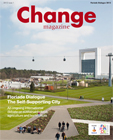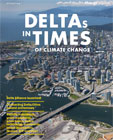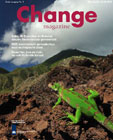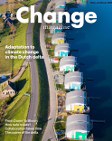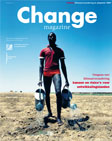Adapting to climate change
Professor Jacqueline McGlade is Executive Director of the European Environment Agency (EAA). She foresees real difficulties for those nations and communities that ignore climate change or are unable to adapt quickly enough.
By Jacqueline McGlade
Over the past 10,000 years, global temperatures have not strayed further than 1°C from the long-term average. In that time, human civilization developed along with agriculture and the global economy. Today, global warming is increasing at an unprecedented rate, pushing temperatures on Earth up by about 0.7°C over the last century. Alaska and Siberia are heating up even more rapidly by about 23°C within the last fifty years. The impacts are already profound. They cut across normal political and economic boundaries, affecting the poor more than the rich. But eventually everyone will feel the impacts.
Industry and society will need to become fully engaged and inspired to act
Recent observations of key climate indicators are already moving beyond the patterns of natural variability within which our societies and economies have developed and thrived. Unabated emissions are expected to cause many climate trends to accelerate, leading to a growing risk of abrupt or irreversible climatic shifts and related changes in major natural systems.
Troublingly, the risk of such large scale discontinuities is now considered to be even higher than estimated in the 2007 report by the Intergovernmental Panel on Climate Change. Some of the changes may have already approached or even surpassed critical thresholds. In the frozen world, in particular, changes such as the melting of glaciers, polar ice caps and sea ice are occurring faster than previously anticipated and the process seems to be accelerating. The loss of Arctic sea ice will transform the pole from a white, reflective expanse to a dark, heat-absorbing surface, leading to further heating. The loss of glaciers threatens livelihoods because communities depend on glacial ice and seasonal snow for their water supplies and local economic activity.
It is in the oceans, however, that we find the greatest threat. Heat from the increasingly warm atmosphere is being absorbed, leading to a gradual expansion of the water itself. The result will be an inexorable rise in sea level, by between 0.8 and 1.4 metres over the next 100 years. This will have major consequences for natural coastal habitats and the many millions of people living in low-lying areas across the world. Another effect of increasing carbon dioxide in the atmosphere is that the oceans are gradually becoming more acidic. Already, scientists have evidence that ocean acidification is jeopardizing the ability of shellfish and corals to develop their exo-skeletons properly.
On land, species of plants and animals will also struggle to cope with the immediate effects of global warming, as their habitats become fragmented and basic resources such as water become more variable or scarce than in the past. Change will come to all of us. But for today's leaders it brings a responsibility to find the ways and means to mitigate and adapt to climate change. The EU has proposed a target of a maximum temperature increase of 2 °C above pre-industrial levels, which would imply a reduction in global gas emissions of at least 50 % by 2050. But even if emissions stop today, climate change will continue for a long time due to the historical build up of greenhouse gases in the atmosphere and the thermal expansion of the oceans. There is thus no question that in Europe we will have to adapt. Southern Europe is expected to become warmer and drier while the north and north-west will most likely become milder and wetter. The risk of coastal and river floods and droughts is projected to increase, with the Arctic, mountain areas, coastal zones, river flood prone areas and the Mediterranean particularly vulnerable. Key economic sectors will need to adapt.
In recent years, it has become clear that adaptation will require changes that cannot be achieved by government action alone. Industry and society will need to become fully engaged and inspired to act. The solutions we will need lie with people: leaders and communities who are already adapting and changing. This is especially evident in some indigenous communities and in the transition towns and ecovillages emerging across Europe, where the changes are leading to a more sustainable and better quality of life. The real difficulties will lie with those communities and nations that ignore the warnings or do not take opportunities to adapt early on, and who will find themselves increasingly vulnerable and unable to change quickly enough. The number of EU Member States with national adaptation strategies is increasing but knowledge about vulnerability and the most cost-effective adaptation actions is still scarce. In the coming years, Europe will also need to support developing countries to develop appropriate adaptation plans. The EEA is ready to support this process by using its expertise to develop and regularly update indicators on climate change impacts, as well as producing critical analyses on relevant issues such as water scarcity and droughts, adaptation options and biodiversity.
This article is a part of the magazine 'Climate Adaptation in Europe'
December 2009
 Synergos Communication
Synergos Communication
